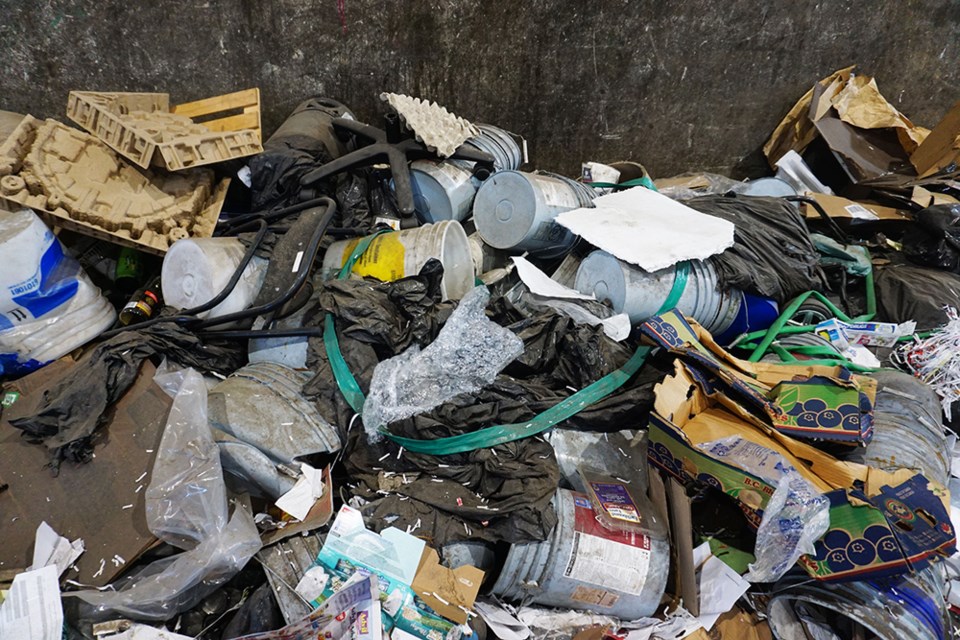While cleaning up after dinner, you wash out your glass jar that contained that night’s pasta sauce. Being environmentally conscious, you place it in your recycling tote, thinking that it will get reused down the road.
Unbeknownst to you, however, that jar will likely end up shattered on the floor of the recycling centre where it will eventually head to the landfillGarbage and glass are two of the leading contaminants in Squamish’s curbside recycling according to an audit from supplied to The Chief by the .
The most recent audit looked at the first three months of 2021 and the incompatibility rate was 16.4%. While this rate is down from previous years — and certainly down from the 27.7% spike at the onset of the pandemic — it remains above Recycle BC’s target rate of 3%.Additionally, over 50% of the incompatibility rate is deemed non-accepted materials, which was largely books and bags of mixed garbage and food waste. Nearly 20% of the incompatibility rate was from glass, which has to be dropped off at Queens Way Recycle Depot or the Â鶹Éç¹ú²úLandfill.
While transporting this recyclable material may be inconvenient, doing so helps protect the collection staff from hazardous material, said Jeff Wint, the outreach sustainability co-ordinator for the District of Squamish.“Glass is a real challenge because it has a number of opportunities to break in that collection cycle,” said Wint.
“So if you picture a piece of glass in your tote it can break when it's getting tipped into the truck, it can break in the truck when [other totes] are getting tipped onto it, it can break when the truck gets dumped out at the recycling depot and broken glass is obviously a hazard for anyone that has to handle that material.”Upon a visit to the recycling centre, indeed, the floor was covered with glass shards. Once the glass is broken, Wint said it can’t be recycled.
“It can get smashed up into a whole bunch of pieces, which makes it very difficult to pick all the pieces out and get that to the right recycling or disposal option,” he said.Other hazardous material in curbside recycling includes flexible plastics, cellphone batteries and camping propane canisters, said Wint. The flexible plastics can jam certain machines throughout the recycling process while cellphone batteries and propane canisters can cause fires, he said.
Beyond the hazards to collection staff, improperly recycled material will end up in the landfill, said Anthony Lau, associate professor at the University of British Columbia with expertise in organic waste recycling and composting.“It will take ages to degrade, if at all,” said Lau. “If you have many of these items, you take up the variable space of the landfill.”
Squamish’s landfill had vertical expansion in 2019, which cost about $6.4 million. Yet, District staff have previously noted that space could run out between 2025 and 2027.The notes that landfill expansion is slated again for 2024, which has a planned budget of $13.5 million and includes expansion for the transfer station and recycling depot.
Calla Farn, vice president of corporate affairs for the Canadian Stewardship Services Alliance, emailed The Chief on behalf of Recycle BC.
Farn said Recycle BC actively works with the District to reduce recycling contamination.
Furthermore, she said that penalties, known as service level failure credits, could be charged $3,750 per load and up to $90,000 per year if contamination goes untouched. But, Farn noted that Â鶹Éç¹ú²úhas not received any penalties nor are any being considered.
“Service level failure credits are only considered when a collector fails to take reasonable steps to reduce their contamination levels.”Wint said if anyone has questions about recycling then they can email [email protected]. Additionally, he said more information about how to recycle is available on the or Â鶹Éç¹ú²úCurbside app.




